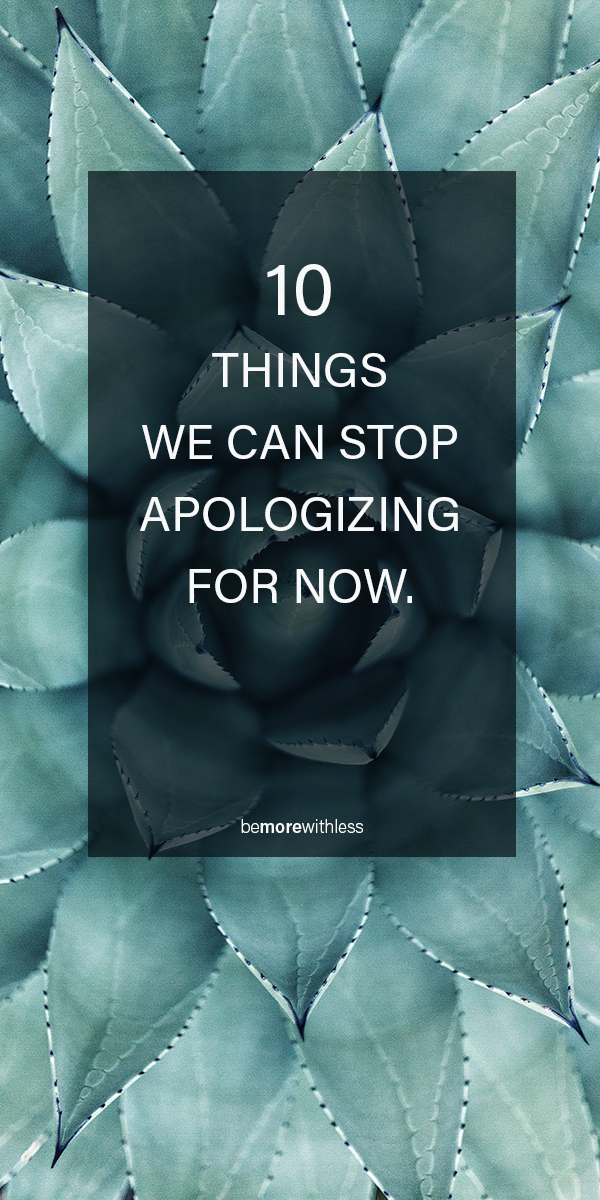
Let’s stop apologizing for things we don’t need to be sorry for. Between our need to please and the way we’ve been conditioned to over-apologize, it’s no wonder our apologies almost feel like they are on auto pilot.
Clutter comes in many forms, from the stuff in our homes to the too many items on our to-do lists. Clutter also exists in how we treat ourselves. Let’s stop apologizing because it’s exhausting and often a quiet reminder that we aren’t good enough. Our hearts show us the way, but unnecessary apologies make us question the connection we have with ourselves. They get in the way of self-trust.
Let’s stop apologizing for these 10 things.
Pay attention to how many times you say, “sorry” in a day and notice what you apologize for. How many times have you apologized when someone else bumped into you? What about when you aren’t feeling your best? Have you ever apologized for actually being sick? A heartfelt “I’m sorry” is powerful. A meaningful apology can repair a relationship or turn us around when we are going in the wrong direction. We diminish that by apologizing for things we shouldn’t be sorry for.
1. Stop apologizing for the way you take care of yourself.
When you put your health first, you can serve and connect from a place you just can’t access when you are rundown, sick or tired. Sometimes we feel like we have to apologize for or explain/excuse our self-care practices. From going to bed early to taking time off to taking a walk in the middle of the day or incorporating more unconventional self-care practices. Feeling guilty and apologizing for taking care of yourself is not taking care of yourself. Good health is nothing to apologize for so please do what’s best for you.
2. We don’t have to apologize for being persistent.
I’ve been working on getting something covered by my insurance company and in all of the zillion calls I’ve made to them, to my doctors and to the pharmacy, I haven’t apologized for my persistence, and I won’t. Are they probably tired of hearing from me? Maybe. Does that mean I have to apologize? Absolutely not.
How many times have you prefaced your persistence with an apology? It goes something like, “I’m sorry to bother you but I’m following up on …” In my experience, in almost every part of our lives, we have to ask for what we want more than once. It’s not because of unreasonable requests, it’s only because your request is more of a priority for you. Don’t take the lack of response as a personal insult.
3. Stop apologizing for seeking clarity.
Being curious and considering new ideas and ways to create, thrive, love, and live is a blessing. When people reject that and make you feel like apologizing, remember that it’s not about you. They may feel threatened and afraid that if you change you may think differently about them. Be gentle instead of apologetic. Ask questions of others, question your own thoughts. Don’t believe everything you see on the internet, on the news or even everything you think.
4. No need to apologize for saying no.
One of the reasons we is that we are so used to doing anything we can not to disappoint others, even if that means disappointing ourselves. Confrontation isn’t fun for most of us either so instead of saying no, we say yes only to notice regret and resentment rise up. There are some examples of how to say no to people , but what we don’t need is a brilliant excuse. “No thank you.” or “Thanks for thinking of me, I’m going to pass.” both work very well. Per usual, less is best.
When you struggle to say, “no” because you tie your worth to how much you accomplish remember that doing more things doesn’t make you better person, it makes you a tired person. Your worth, your heart, your you-ness, it’s not connected to how many checkmarks are on your to do list, how clean your house is or how many hoops you jumped through at work. Check in with the “doing more” part of your life. Is it working for you or against you? What would happen if you pulled back a little?
5. You never have to apologize for being you.

6. You are allowed to change your mind.
Sticking to it for the sake of sticking to it serves no one. Things change outside and inside. When we hold on so we can be right or because we are afraid to change course because of what others may think, we compromise the opportunity to learn and grow. From stuff, ideas, and projects to commitments, expectations and goals, I remind myself that I won’t hold on to something just because I used to think it was a good idea. Maybe it was, but it’s not anymore.
7. Don’t apologize for responding slowly.
It’s 2024. We are in the age of information overwhelm. You don’t have to apologize for taking a few days to respond to a text message, phone call or email. In fact, if you take too long, you’ll get another request (see number two). How many of your emails, voice mails, or other interactions start with “sorry for taking so long to get back to you” even though it’s been less than a day? We are doing our best, no need to apologize. “Thanks for your patience” may be appropriate but otherwise, carry on.
8. Stop apologizing for letting go of what no longer serves you.
You get to decide what’s important to you and can let the rest go without apology. This includes things like: clutter in your closet, harsh words someone said to you and certain thoughts that hold you back from enjoying your life. You can let go of things that were expensive (haven’t you paid enough?) and things that were a really good deal. As the saying goes, If the price is the best thing about it, it’s not worth it. Especially when you are tired, stressed or overwhelmed, the answer is usually … less. Get rid of something, lots of somethings.
Letting go of things is a process, of course. Some of those things we’ve carried for so long that we forget how glorious the lightness is that comes from carrying less. As I release the things, I sleep better, laugh more and open my heart back up for more of what’s waiting for me in the world. It’s a relief to release the things I’ve been dragging along, or maybe they were dragging me.
9. It’s ok to feel your feelings.
Why do we so easily apologize when we cry? Feeling and expressing those feelings is just us being human. This apology may come from cultural conditioning or past trauma. The vulnerability of our feelings not only connects us but it heals us. It’s ok. It this feels like more painful issue for you, consider additional support from a mental health specialist.
10. Holding boundaries is not something to be sorry about.
If you need to set boundaries for your own mental and/or physical wellbeing, do it. Don’t worry about who might get upset. That part isn’t up to you. You may be apologizing because you feel guilty for holding your boundaries but instead of guilt, it’s likely discomfort you are feeling. Brené Brown says, “Daring to set boundaries is about having the courage to love ourselves, even when we risk disappointing others.” Her mantra when setting boundaries is, “Choose discomfort over resentment.” If you aren’t willing to experience the discomfort, you might be resentful later of yourself or others for not giving you what you need.
When you stop apologizing for these 10 things, think about where else you may want to rein in your apologies. By being more thoughtful about your intentions and how and when you want to apologize, you’ll create more room in your day and in your heart for more meaningful conversations, apologies that matter and forgiveness for yourself and others.







Are you done in of fatiguing every diet and allay not seeing results? Overcome 10 pounds in a week with this miracle weight bereavement unravelling Reverse aging naturally that’s stupefying doctors everywhere. You at worst necessity the same nuisance a period to yearn fat instantly and get the main part you’ve again dreamed of.